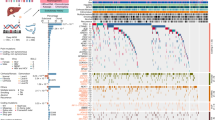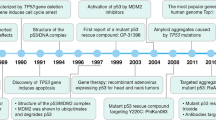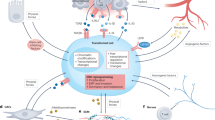Abstract
Recently, the gene PTPRJ (protein tyrosine phosphatase receptor type J) was identified as the candidate gene for the mouse colon cancer susceptibility locus Scc1. Its human homologue PTPRJ is frequently deleted in several cancer types, including colorectal cancer. To elucidate the role of PTPRJ loss in different stages of colorectal cancer and in its pathways of progression, we expanded the previously published comparative genomic hybridization results with novel data on loss of heterozygosity (LOH) at the PTPRJ locus. We identified a strong association between the LOH of PTPRJ and the loss of chromosomal region 18q12–21 (P=0.009). This observation is specific for progressed colorectal adenomas, suggesting that an interaction between LOH of PTPRJ and loss of 18q12–21 may be involved in the development of a more progressed form of adenomas.
This is a preview of subscription content, access via your institution
Access options
Subscribe to this journal
Receive 50 print issues and online access
$259.00 per year
only $5.18 per issue
Buy this article
- Purchase on Springer Link
- Instant access to full article PDF
Prices may be subject to local taxes which are calculated during checkout

Similar content being viewed by others
Abbreviations
- CGH:
-
comparative genomic hybridization
- LOH:
-
loss of heterozygosity
- PTPRJ :
-
protein tyrosine phosphatase receptor type J
- Scc1:
-
Susceptibility to colon cancer-1
References
Hermsen H, Postma C, Baak J, Weiss M, Rapallo A, Sciutto A, Roemen G, Arends J-W, Williams R, Giaretti A, Goeij A and Meijer G . (2002). Gastroenterology, 123, 1109–1119.
Hermsen M, Meijer G, Baak J, Joenje H and Walboomers J . (1996). Hum. Pathol., 27, 342–349.
Lengauer C, Kinzler KW and Vogelstein B . (1998). Nature, 396, 643–649.
Moen CJ, Snoek M, Hart AA and Demant P . (1992). Oncogene, 7, 563–566.
Moustakas A, Souchelnytskyi S and Heldin C-H . (2001). J. Cell Sci., 114, 4359–4369.
Ruivenkamp C, van Wezel T, Zanon C, Stassen A, Vlcek C, Csikós T, Klous A, Tripodis N, Perrakis A, Boerrigter L, Groot P, Lindeman L, Mooi W, Scholten G, Dauwerse H, Paces V, Zandwijk N, van Ommen G and Demant P . (2002). Nat. Genet., 31, 295–300.
Trapasso F, Iuliano R, Boccia A, Stella A, Visconti R, Bruni P, Baldassarre G, Santoro M, Viglietto G and Fusco A . (2000). Mol. Cell. Biol., 20, 9236–9246.
Vogelstein B, Fearon ER, Hamilton SR, Kern SE, Preisinger AC, Leppert M, Nakamura Y, White R, Smits AM and Bos JL . (1988). N. Engl. J. Med., 319, 525–532.
Weiss MM, Hermsen MAJA, Meijer GA, van Grieken NCT, Baak JPA, Kuipers EJ and van Diest PJ . (1999). Mol. Pathol., 52, 243–251.
Acknowledgements
We thank Margriet Snoek, Carlo Zanon and Tamás Csikós for comments on the manuscript. This work was supported by Dutch Cancer Society Grants NKI97-1463 (to PD) and VU97-1455 (to GM).
Author information
Authors and Affiliations
Corresponding author
Rights and permissions
About this article
Cite this article
Ruivenkamp, C., Hermsen, M., Postma, C. et al. LOH of PTPRJ occurs early in colorectal cancer and is associated with chromosomal loss of 18q12–21. Oncogene 22, 3472–3474 (2003). https://doi.org/10.1038/sj.onc.1206246
Received:
Revised:
Accepted:
Published:
Issue Date:
DOI: https://doi.org/10.1038/sj.onc.1206246
Keywords
This article is cited by
-
Meta-analysis of association between Arg326Gln (rs1503185) and Gln276Pro (rs1566734) polymorphisms of PTPRJ gene and cancer risk
Journal of Applied Genetics (2019)
-
Genetic alterations of protein tyrosine phosphatases in human cancers
Oncogene (2015)
-
Loss of PTPRM Associates with the Pathogenic Development of Colorectal Adenoma-Carcinoma Sequence
Scientific Reports (2015)
-
The protein tyrosine phosphatase DEP-1/PTPRJ promotes breast cancer cell invasion and metastasis
Oncogene (2015)
-
In silico analyses reveal common cellular pathways affected by loss of heterozygosity (LOH) events in the lymphomagenesis of Non-Hodgkin’s lymphoma (NHL)
BMC Genomics (2014)



